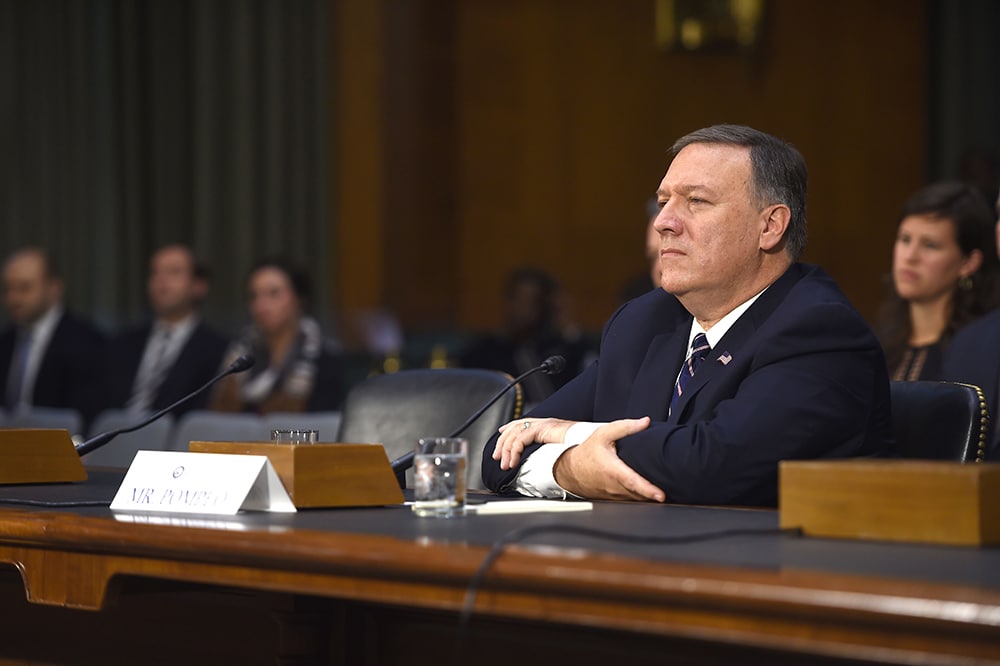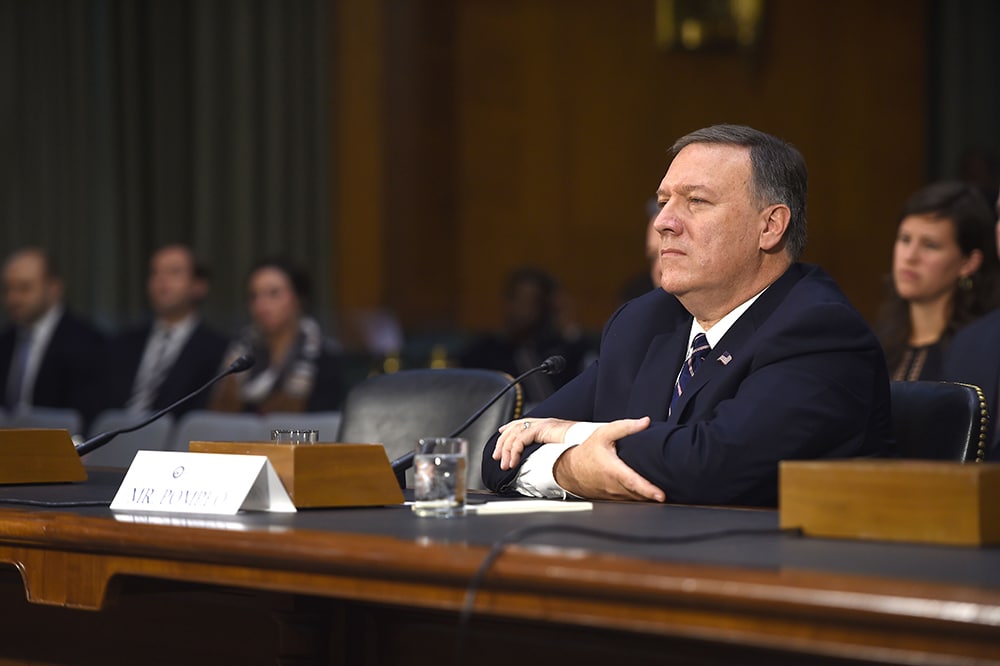
On MSNBC’s “All In” on March 13, I discussed how the removal of Rex Tillerson from the position of secretary of state was the final triumph of largely Republican efforts—but with complicit Democrats as well—to consolidate the making of foreign and security policy exclusively in the White House. Since the 1947 National Security Act, there has been institutional momentum for this shift. It is important to be aware of this institutional momentum because to reverse the shift will require much more than just a new president and administration. It will take statutory change by the Congress. Such change must be highly deliberative and thus will take time. Immediately, however, the damage to US foreign and security policy—and the country in turn—could be so immense that temporary, non-statutory actions are essential.
Having Mike Pompeo at State, Gina Haspel at the CIA, Nikki Haley at the United Nations, and three military professionals closely advising a grossly inexperienced and narcissistic president is sufficient to give pause to anyone interested in arresting the significant deterioration of our democracy. But putting all control over the main instrument of national power that this team is most apt to use—the military—in the hands of one man, Donald Trump, makes President Xi Jinping’s move in China following the Nineteenth Party Congress pale in comparison. First, Xi is not a warmonger, and, second, Trump has become one. If Americans believe that 17 straight years of war is enough, they need to stand by: another 17 or more is in the offing. Blood and treasure will be the payment for years to come.
Iran and North Korea—the latter despite the “historic” opening of talks—are merely the leading possibilities. Russia and China loom in the foreground, not the background. Conservation of enemies is not a principle of this White House team. Rather, it wants to make as many enemies as possible, at the same time as it destroys traditional alliances and dismays and distances US friends.
Avigdor Lieberman, Israel’s defense minister, is scheduled to give the keynote address at the Jerusalem Post’s conference in New York in April. The title of his address is published as “The Coming War With Iran.” Any American citizen who believes this White House team will not involve the US in Israel’s war needs to check into a mental ward.
Similarly, the historic summit with Kim Jong-un of North Korea will likely never happen (its startling announcement was used cleverly to clear the TV screens of Stormy Daniels, repetitive Russia scandals, and unheralded White House departures). If by some miracle of fate this summit should happen, Donald Trump will be the loser, not the winner, and everyone will pay the piper for his folly, possibly with one of the bloodiest wars of this young century.
But the Syria conflict will most likely be the conduit through which this presidential team, linked at the hip with Prime Minister Bibi Netanyahu’s team, pursues its first new and immediately most likely use of military power. However, even the unending war thus produced—for that is precisely what it will be—will not sufficiently satisfy the appetites of this team. Moreover, taking on Syria and Iran might well lead to Russia. Putin has said as much publicly.
The Nightmare Scenario
Imagine this scenario for a frightening moment. While embroiled in Syria with Israel at our side, Russia and Iran confront the US and no one backs down. Turkey leaps into the mix to finish off as many Kurds as possible as the inevitable major regional war begins. Meanwhile, in the South China Sea, China delivers and immediately acts upon an ultimatum to Taipei. This bellicose White House team led by Donald Trump challenges China and, in the process, immediately loses USS Carl Vinson, sunk in minutes by a combination of missiles, torpedoes, and precision-guided bombs, an aircraft carrier worth $14 billion with about 5,000 souls on board.
Mr. President, what do you and your team do now?
Frankly, I believe this bone-spur-afflicted warrior will run upstairs in the White House, close the door firmly, pick up his smart device, and commence tweeting that, among other things, it was not his fault. After all, he tried to put America first. It was all those damnable neo-cons who fouled his ship of state.
This is a more-than-imaginable scenario for a 31-year military professional such as I. That should frighten the hell out of all those tens of millions of people all across America who have never, in all their lives, ridden to the sound of guns or heard bullets and shrapnel whiz by their ears. That an academic of now some sixteen years should state it so categorically should reinforce their fright.
Using the Confirmation Hearings
At this moment, the surest and most immediate first step in beginning a process to prevent this more-than-plausible scenario from developing into a reality is to use the Senate confirmation hearings of Mike Pompeo and Gina Haspel to challenge powerfully the entire foreign and security policy of this aberration of an administration.
Democrats and Republicans alike must make these hearings a litmus test of the Trump administration’s foreign and security policy. At minimum, Congress must interrogate its planned approach in Syria and its explanation of the brutal Saudi-led war in Yemen that it is aiding and abetting. It must challenge the administration’s vision for a long-term US-Russia policy, its ultimate objective with Iran and the nuclear deal, and its strategy for North Korea and the entire Korean Peninsula, as well as Japan, not to mention the overall strategy for dealing with the number one economy in the world, China. Congress must assess the covert operations in Ukraine, Venezuela, and elsewhere, the approach to Mitrovica and the rest of Kosovo and the ultimate objective with regard to Turkey, including its approach to dealing with the growing tension on Cyprus—fueled by Ankara—and the brewing fight over the Eastern Mediterranean’s gas fields. Congress must also evaluate the administration’s immediate and long-term plans for countering aggressive Russian actions in the Arctic and conduct an overall review of US policy with respect to Mexico, Canada, and the remainder of the Western Hemisphere.
Impossible? Not at all, if Congress knows what it’s doing. I realize that’s a huge charge for this Congress, but I persist nonetheless because recently I’ve detected a growing unease on the Hill and a desire to do something. A few smart members are willing to lead such an effort.
In 1985, Admiral William J. Crowe, then commander of the US Pacific Command, took President Ronald Reagan on a ride in his admiral’s yacht out into Pearl Harbor. At the time, I was executive assistant to Bill Crowe’s right-hand man, the head of strategy and policy for the Pacific Command, Rear Admiral Stewart A. Ring. Stew and Bill had made certain that they were ready for this occasion.
On the yacht, in less than three hours, with only a large map and the power of his intellect, Bill Crowe gave the president a tour d’horizon of the largest, most difficult-to-manage regional command in the US repertoire. Encompassing 35 nations, the vast Pacific and most of the Indian Oceans, a diversity of outlooks, leaders, and US ambassadors, it was the most complex, challenging, and largest command in the Unified Command Plan, the presidentially approved document that lays out US global responsibilities.
Crowe was so successful that Reagan returned to Washington and shortly thereafter summoned Crowe to join him in the capital city as the next chairman of the Joint Chiefs of Staff (JCS). It was an excellent decision, based on Reagan’s intellectual and intuitive conclusion reached on that yacht in Pearl Harbor after hearing the most superb delineation of foreign and security policy the president had ever entertained in such a brief and concentrated period. In fact, it was so powerful and convincing an experience that Reagan overrode the recommendation of his then-serving JCS, General Jack Vessey, for his successor and instead chose Crowe.
That is the sort of testimony and answers that Senator Bob Corker (R-TN), chairman of the Senate Foreign Relations Committee (SFRC), and all the members of the SFRC, majority and minority, ought to expect and get from Mike Pompeo. Although more focused on strategic intelligence and torture—the latter Gina Haspel’s greatest and most worrisome legacy—the Senate Select Committee on Intelligence (SSCI) ought to hammer this nominee as well.
If at times these two nominees need a break to refer back to the White House in order to answer a particular question, that time should be granted—not to answer “questions for the record” but to return to the sitting committee chambers and resume testimony. It should be one of the most deliberative processes the SFRC and SSCI have ever conducted, much like the committee hearings that examined the relief of General Douglas MacArthur by President Truman in 1950, which featured hours and hours of truly superb testimony from men such as George C. Marshall and Omar Bradley.
Rising to the Occasion
This means that SFRC members such as James Risch (R-ID), Robert Menendez (D-NJ), Marco Rubio (R-FL), Cory Gardner (D-CO), Todd Young (R-IN), Ben Cardin (D-MD), Jeanne Shaheen (D-NH), Cory Booker (D-NJ), and others will need to study hard, put aside politics as much as possible, stretch themselves into bigger and better representatives of the people, form incisive questions, and ask them deliberately and pointedly, within time constraints and the chairman’s prerogatives, and not take frivolous or ambiguous answers without counterstriking.
With the SSCI it will be more difficult, to be sure. Senator Richard Burr (R-NC), the SSCI chairman, has demonstrated an unparalleled obtuseness and an affection for political power at the expense of his country’s true interests that seems unchangeable. But it must be. Or Mark Warner (D-VA)—so far having done nothing at all to distinguish himself—in his capacity as ranking member must defy Burr and take the hearing to the levels to which it should rise. America’s future is at stake like at no other time since 1861.
Perhaps I have just assigned impossible tasks to mediocre people. Their track record to this point seems to indicate it. But as John Kennedy illustrated so dramatically in his Profiles of Courage, on occasion the call of duty and country does in fact surmount the craven call of politics. It must be so in these hearings.
If it is not, then the next opportunity for Congress to halt the war machine will be, as with the war in Vietnam, after countless useless deaths, huge expenditures of taxpayer dollars, and little if anything gained. Or far worse.
Lawrence Wilkerson is the Distinguished Visiting Professor of Government and Public Policy at the College of William and Mary. He was chief of staff to Secretary of State Colin Powell from 2002-2005. He served 31 years in the US Army.
Reprinted with author’s permission from LobeLog.

